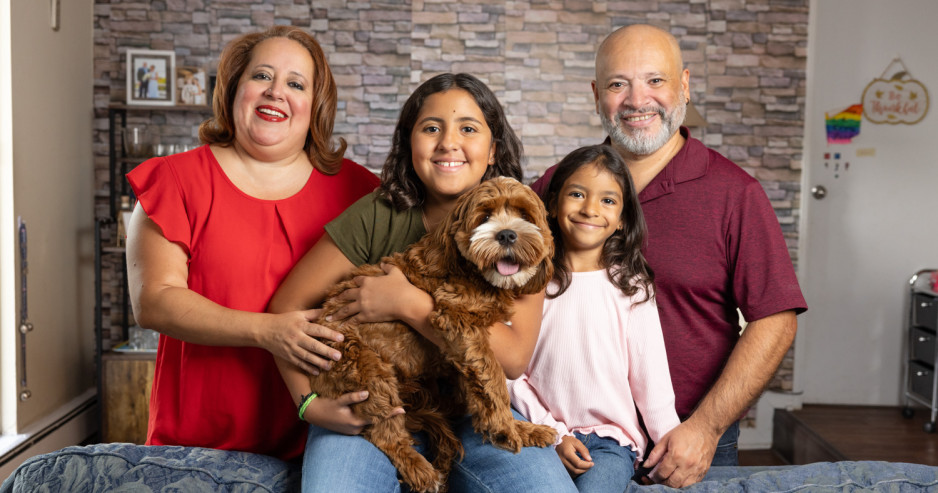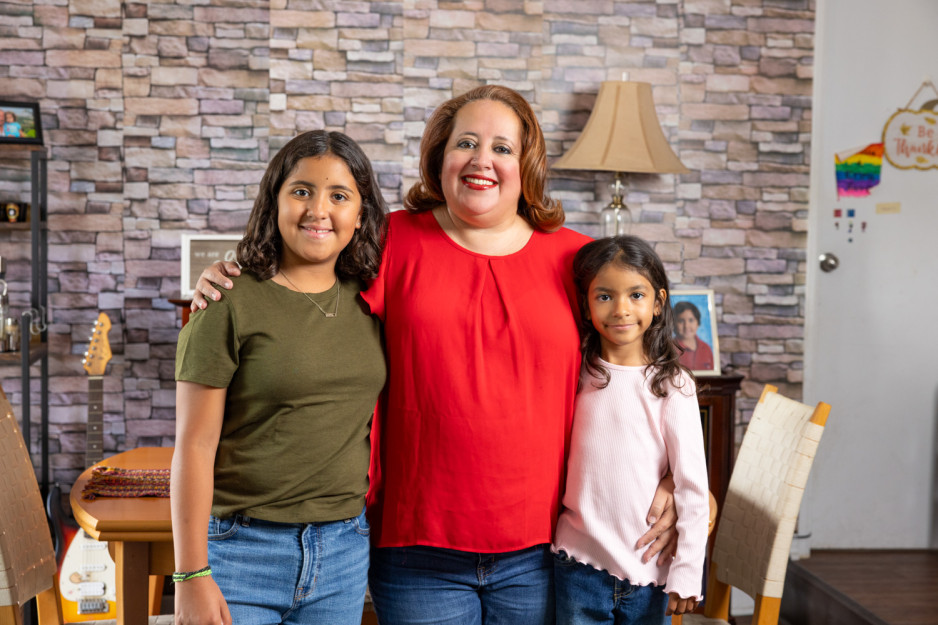Light in the darkness
This holiday season, Fressia Rivas is feeling hopeful. It’s been almost five years since she experienced a stroke, out of the blue, right before Christmas 2019. Since then, she’s been on a long journey of recovery, navigating the physical, mental and emotional challenges of her condition.
Now, with her husband at work, her daughters at school, and her new puppy Bruno snoozing away, Rivas takes a moment to look back at how far she’s come since her stroke. “I feel recovered, I feel purpose and I feel hope,” she says.
A new way of life
Rivas moved to Canada from El Salvador in 2016 with her husband, a Canadian citizen, and her daughter. She found adjusting to a new country a little challenging, but in time they settled into a comfortable life in London, Ontario, and welcomed a second daughter. She had worked as a teacher back in El Salvador, and took a job in a customs broker company in Canada.
Everything changed on the day of her stroke. The family was driving home from a holiday party when she felt a pop in her neck and was overtaken by debilitating dizziness. “It was like my whole world turned around,” she describes the moment.
Hoping the feeling would pass quickly, she rested at home. But the next day brought strong headaches, fatigue and sensitivity to light. She knew something was very wrong, but didn’t expect a stroke. She was only 36 at the time and had no risk factors.
Rivas took a medical leave from work and spent three months resting at home, where she slept around the clock with intense headaches. She tried returning to work but quickly realized she wasn’t well enough to be there.
Her husband had heard about the stroke rehabilitation program at St. Joseph’s and tried to get a referral. But then the COVID-19 pandemic hit and everything went on pause.
“I didn’t see any hope, no future ahead, all my dreams crushed,” she says about that dark time. “My sleep was distorted, and I didn’t know when my symptoms would appear. I couldn’t put together meals to feed my daughters and that was killing me. I knew I needed to be functional for my family. I felt sick, sad, lost and defeated.”
The road to recovery
Finally, she was seen in the stroke rehabilitation program – and right away, gained a new perspective on what had been happening to her.
“Until that point, I didn’t really understand that I’d had a stroke and what that really meant. I got a better sense of how to recover.”
Rivas attended some appointments in person and did others virtually. Working with a clinical team that included a doctor, physiotherapist, occupational therapist and social worker, she threw herself into care headfirst, determined to get better not only for herself but for her family.
With treatment came hope. Rivas slowly learned that recovery wasn’t just an idea – it was something that was possible for her. “It was going to be some work, but it was going to happen,” she recalls.
She learned that damage to her vestibular nerve was causing most of her issues. She found effective medications, got new glasses to help focus and started using specialized equipment like compression vests. She took physiotherapy fitness classes and worked closely with a therapist to address her mental and emotional health.
Healing the mind, body and spirit
Care also played an important role for the rest of the family. Her oldest daughter was seven at the time of the stroke, and the changes Rivas experienced took a toll on her.
“She lost a mom, a very active mom who would play with her. That mom doesn’t exist now. A part of my journey has been to teach her that I'm okay with who I am now.”
Therapy sessions have helped her daughter address her anger and process her grief, too.
“Now she's understanding what happened to me, and that her mom has a condition that she’ll have forever. My daughters can tell when I’m feeling tired or overstimulated.”
Today, she’s in a much better place.
“I was down,” she says candidly. “I was having the hardest time. It has taken me a while, but we're going up again with a bright future ahead. It’s okay to change the path.”
Rivas recently took over her father’s real estate business in El Salvador and she’s able to do more activities with her family, like movie nights, swimming at the beach and training Bruno the puppy. She’s careful to pace herself and rest when she needs to.
Rivas is thankful for the care teams at St. Joseph’s who helped her navigate the darkness of life post-stroke and find the light on the other side.
“They were providing their best to help patients get better,” she says. “I really felt that. And that’s what made me feel there was hope in life again. Sometimes it’s hard to see recovery. But they helped me realize that I was going to make it.”


